

Crime Broadsides Project, Harvard Law School Library. History of Wales. Prehistoric Wales[edit] The earliest known human remain discovered in modern-day Wales is a Neanderthal jawbone, found at the Bontnewydd Palaeolithic site in the valley of the River Elwy in North Wales, whose owner lived about 230,000 years ago in the Lower Palaeolithic period.[6][7] The Red Lady of Paviland, a human skeleton dyed in red ochre, was discovered in 1823 in one of the Paviland limestone caves of the Gower Peninsula in Swansea, South Wales.
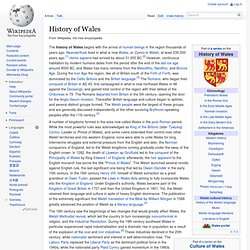
Despite the name, the skeleton is that of a young man who lived about 33,000 years ago at the end of the Upper Paleolithic Period (old stone age).[2] He is considered to be the oldest known ceremonial burial in Western Europe. The skeleton was found along with jewellery made from ivory and seashells and a mammoth's skull. Bryn Celli Ddu, a late Neolithic chambered tomb on Anglesey Following the last ice age, Wales became roughly the shape it is today by about 8000 BC and was inhabited by Mesolithic hunter-gatherers. Manorial Documents Register. Old Bailey Online - The Proceedings of the Old Bailey, 1674-1913 - Central Criminal Court.
Grand Lodge - Scotland. Bonnie Prince Charlie and the Jacobites, Scotland - UK History. History of Scotland. Freemasonry. Freemasonry is a fraternal organisation that traces its origins to the local fraternities of stonemasons, which from the end of the fourteenth century regulated the qualifications of masons and their interaction with authorities and clients.
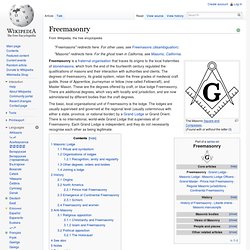
The degrees of freemasonry, its gradal system, retain the three grades of medieval craft guilds, those of Apprentice, journeyman or fellow (now called Fellowcraft), and Master Mason. These are the degrees offered by craft, or blue lodge Freemasonry. There are additional degrees, which vary with locality and jurisdiction, and are now administered by different bodies than the craft degrees.
The basic, local organisational unit of Freemasonry is the lodge. The lodges are usually supervised and governed at the regional level (usually coterminous with either a state, province, or national border) by a Grand Lodge or Grand Orient. Masonic Lodge Palazzo Roffia, Lodge in Italy set out for French (Moderns) ritual. Womens Order of Freemasonry.
Welsh Freemasonry. History of Freemasonry in the Province of North Wales. No institution can boast a more solid foundation than that on which Freemasonry rests - the practice of every moral and social virtue!
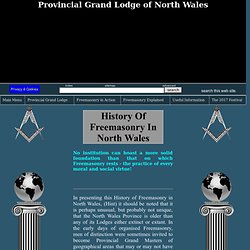
At that time not all these Lodges would have been affiliated to the Premier Grand Lodge. The name of William Hughes of Holt is the very first reference, so far discovered, to speculative masonry in North Wales. His name is included amongst the list of members of a Freemasons Lodge meeting in Chester in 1660. Several of the other names listed are of Welsh origin but his is the only one whose place of residence is particularly noted to be in Wales. The Province itself dates its origin from the appointment, by a deputation issued on 10th May 1727 by Lord Inchiquin, the then Grand Master of the Premier Grand Lodge of England, of Captain Hugh Warburton of Winnington Hall, Chester, a career officer with the 7th Regiment of Foot, as Provincial Grand Master for North Wales at Chester.
What is remarkable about this particular appointment is that Capt. Masonic Province of South Wales - Home Page. Bonisteel_Masonic_Library. History - Home. The Centre for Research into Freemasonry and Fraternalism. Freemasonry and the Problem of Britain Inaugural lecture by Andrew Prescott to mark the launch of the University of Sheffield's Centre for Research into Freemasonry, 5 March 2001. Most inaugural lectures draw together research which has been in progress for many years.
This inaugural lecture is unusual in that it marks the launch of a new programme of research, with the establishment here at the University of Sheffield of the Centre for Research into Freemasonry, the first such centre in a British university. I will not this evening be presenting the fruits of years of reflection on the subject of freemasonry, but will instead seek to convey why this is an exciting new area for research.
I will, however, take advantage of one tradition of the inaugural lecture and begin with some personal reflections. I was born in Battersea, an unremarkable area of south London, which was until the early nineteenth century a peaceful country village. Origins of Freemasonry. The Origins of Freemasonry A Lecture given on 25 August 2000, at the 5th International Conference of Great Priories in The Albert Halls, Stirling, Scotland by.
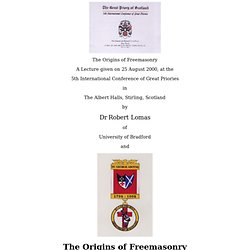
Freemason intelligence service Yearbooks - latest Grand Lodge of England. See also my Bilderberg site masons page August 2008 - latest additions (1) 2007 Spreadsheet of Scottish Freeemasonic Officers and (2) PDF of 2006/7 Freemasons' Yearbook for England and Wales Adobe - Pdf pages of the 2003/4 Masonic Yearbook from web site - These files were moved from that page in the last few days of August 2004 Complete PDF file of the Freemason handbook of 2003/4 including full contact details and officers of all provincial offices - June 2006 - Complete list of Scottish Freemason Officers as an Exel Spreadsheet - sorted by lodge number, surname and county - Crucial site on freemasonry - - there are many more but this is one of the best - download the lot onto your hard drive with an offline browser This information is for wide and free distribution.
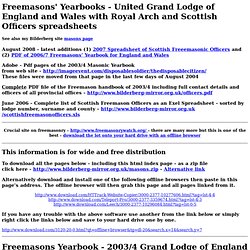
Cecil Rhodes. Historian Richard A.
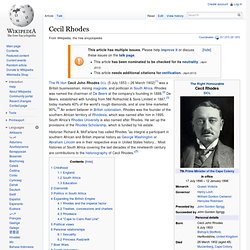
McFarlane has called Rhodes "as integral a participant in southern African and British imperial history as George Washington or Abraham Lincoln are in their respective eras in United States history... Most histories of South Africa covering the last decades of the nineteenth century are contributions to the historiography of Cecil Rhodes. "[5] Childhood[edit] Cecil John Rhodes a.k.a Cecil Rhodes, a historic profile. So in 1888 Rhodes had tricked Lobengula , the Ndebele (Matebele) ruler, into an agreement by which Rhodes secured mining concessions in Matebeleland and Mashonaland.
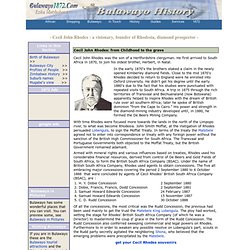
He exploited these through the British South Africa Company (organized 1889), which soon established complete control of the territory. The Rhodes Scholarships. Rhodes Scholars: Complete List, 1903-2011 - The Rhodes Trust. Manchester Evening News. Manchester United Official Web Site. History of manchester united. Manchester United - Club Facts and History, photos, stats, legends - about Man United. History of Manchester United. Old Trafford 1909 was also a milestone for United for another reason.
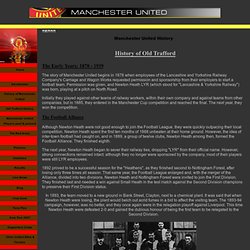
John Henry Davies once again lent financial support by lending £60,000, a huge sum at the time, to finalise the team's move to Old Trafford. They played their first game there on 19 February 1910 as Liverpool spoiled the celebrations with a 4-3 win in a close game. Ernest Mangnall's leadership brought United to their first successful era. History of Manchester United F.C.
Player and latest Transfer Profiles. History of Manchester City F.C. Club History - The Club. Manchester History. Freemasons' Hall Manchester. The History of Manchester. The annals of Manchester: a chronological record from the earliest times to the end of 1885 : Axon, William E. A. (William Edward Armytage), 1846-1913.
Manchester Orange Order - Home. Manchester UK. Birmingham Old Edwardian Lodge, No.7115. Three Shires Lodge No. 5103. Welcome - Warwickshire Freemasons. Birmingham. London. Plantation of Ulster. The counties of Ulster (modern boundaries) that were colonised during the plantations.
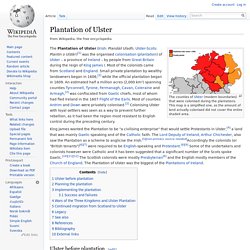
This map is a simplified one, as the amount of land actually colonised did not cover the entire shaded area. King James wanted the Plantation to be "a civilising enterprise" that would settle Protestants in Ulster,[4] a land that was mainly Gaelic-speaking and of the Catholic faith. The Honourable The Irish Society. The Honourable The Irish Society, commonly known as The Irish Society,[1] is the organisation created by royal charter consisting of members nominated by livery companies of the City of London, set up to colonise County Londonderry during the plantation of Ulster.
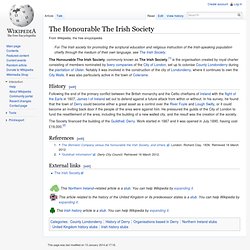
Notably it was involved in the construction of the city of Londonderry, where it continues to own the City Walls. It was also particularly active in the town of Coleraine. History[edit] Following the end of the primary conflict between the British monarchy and the Celtic chieftains of Ireland with the flight of the Earls in 1607, James I of Ireland set out to defend against a future attack from within or without.
In his survey, he found that the town of Derry could become either a great asset as a control over the River Foyle and Lough Swilly, or it could become an inviting back door if the people of the area were against him. History - Wars and Conflicts - Plantation of Ulster - London Companies - Professor James Stevens Curl - The Honourable The Irish Society. History - Wars and Conflicts - Plantation of Ulster - London Companies. The London Companies - Flash Movie. The Honourable The Irish Society. Irish Freemasons. The City Livery Companies.
Worshipful Company of Mercers. Etymology[edit] The word "mercer" derives from the Latin merx, mercis, "merchandise"[3] from which root also derives the word "merchant".[4] The word mercero still used in Spanish has a meaning similar to haberdasher, although the medieval mercers would not have recognised any relationship to that trade which was covered by the separate Worshipful Company of Haberdashers. Mercer foundations[edit] There was also a Mercers' School[6] which was granted its first charter in 1447, and closed in 1959 when pupil numbers fell. The school was most recently based in Barnard's Inn in Holborn, now the home of Gresham College. Mercers' Hall[edit] The Mercers' Company is based at Mercers' Hall in Ironmonger Lane, off Poultry, in the City of London. Membership[edit] Children whose father or mother was a member of the Company at the time of their birth have an automatic right to become Mercers by 'patrimony'.
Most other members have a family connection to the Company and obtain their Freedom by Redemption. Livery Company. The livery companies of the City of London are various historic trade associations almost all of which are known as the "Worshipful Company of... " their relevant trade, craft or profession.[1][2] The medieval companies originally developed as guilds and were responsible for the regulation of their trades, controlling, for instance, wages and labour conditions. Until the Protestant Reformation, they were closely associated with religious activities, notably in support of chantry chapels and churches and the observance of ceremonies, notably the mystery plays. Some of the livery companies continue to have a professional role today: for example, the Scriveners' Company admits senior members to that profession, the Apothecaries' Company awards post-graduate qualifications in some medical specialties, and the Hackney Carriage Drivers' Company comprises licensed London taxicab drivers who have learnt the "knowledge of London".
Governance[edit] Livery halls[edit] Precedence[edit] See also[edit] GRAND LODGE - Home Page. Freemasons & Freemasonry - Masons - Masonic Lodge - About The Freemasons - Join The Masons. Grand Lodge - Introduction. United Grand Lodge of England » Famous Masons. British Masons (Presentation 2011) Freemasons Ritual Video. Famous British Masons. United Grand Lodge of England » Home.
Resources. Democratic government 'slippage'- implosion. Open Society. Affaires et Corruption. Freedoms/Rights. The Big Picture: undercurrents / influences / inspirations. Democratic government 'slippage'- implosion. Politics & Activism. Literature. CIVILIZATION 2.0. New York Historical Society.